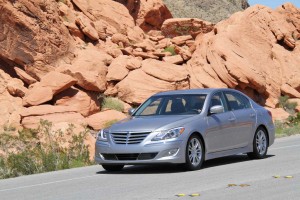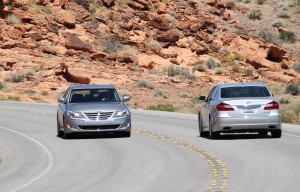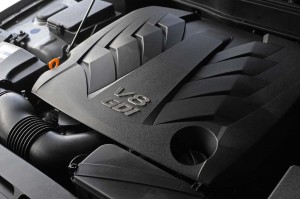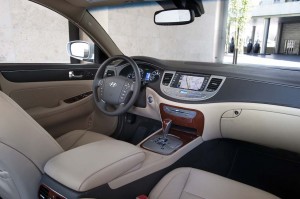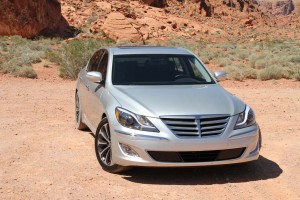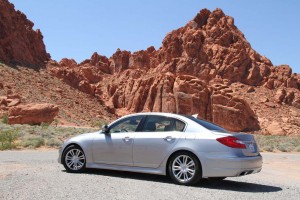It’s not easy to change a brand’s image. Build a reputation for poor reliability and you can struggle for decades convincing customers you’ve turned things around. So how, you might ask, has Hyundai achieved its image makeover in such a short period of time?
Certainly, the 10-year warranty helped, as did its rapidly improving performance in third-party surveys, like the J.D. Power Initial Quality Study. Then there’s the Genesis sedan. Few took the Korean maker seriously when it announced its entry into the mid-luxury segment, but when the Hyundai Genesis sedan was named North American Car of the Year, in January 2008, few were still snickering.
Though the original, mid-luxury sedan probably wasn’t as much the driver’s car as a BMW 5-Series nor the lavishly-finished luxury saloon of a Mercedes-Benz E-Class, the first Hyundai Genesis was a clear breakthrough for the Korean carmaker and a bargain for buyers who wanted to move up-market without paying the traditional premium for German or Japanese Luxury models. Significantly, even with a new update coming, sales of the Hyundai Genesis continue to grow.
In its first incarnation, Car of the Year jurors seemed ready to forgive the sedan its modest sins. Now, as Hyundai prepares to launch a significant update for the 2012 model-year, however, it needs be judged on a truly level playing field. How does it stack up?
It still isn’t quite a direct match for the best Europeans, though the Japanese competition needs to be even more worried than before. And, yet again, a strategy of offering plenty of content at a surprisingly affordable price still works in favor of the 2012 Hyundai Genesis. Now add an all-new version of the sedan, the performance-oriented 2012 Hyundai Genesis 5.0 R-Spec and the maker should anticipate the need to get its factory working even harder in the months to come.
Officially, Hyundai proclaims the 2012 model the second update of the Genesis sedan line (which is not to be confused with the smaller, less expensive Genesis Coupe). Visually, the changes are modest and include a revised front bumper, revised chrome trim, the LED headlight accents that are becoming ubiquitous, these days, revised rocker panels, new dual asymmetric exhaust tips and a few other details that only the most observant Genesis fan will notice.
Inside, the maker has upgraded the look of the sedan’s wood trim, the overall look coming a bit closer to what you’ll find from the best of the Europeans in this competitive segment. There’s also a fair bit of new technology, including Lane Departure Warning, heated rear seats and a TFT LCD display mounted between the speedo and tach.
But what really deserves notice is what Hyundai has done under the hood. Even the base car undergoes some significant powertrain enhancements. The previous 3.8-liter V6 remains – but it’s been modified to handle direct injection. The wonder of that technology is that it delivers the seeming contradiction of boosting performance and mileage while also reducing emissions. Consider that for 2012, the Genesis 3.8 gets a bump up to 333 horsepower and 291 lb-ft of torque – compared to 290 and 264 for the ’11 sedan. Meanwhile, mileage reaches 19 City/29/Highway, up from 18/27.
The V6 isn’t the only reason the mileage improves. Hyundai also equips all three of the 2012 Genesis models with a new 8-speed automatic transmission it developed in-house. It’s a surprisingly solid gearbox and one that we came to appreciate the more we drove. In fact, we discovered that initially slow and cumbersome shifts became quick and crisp the more time we spent behind the wheel – reflecting, we were later told, the learning algorithm built into the gearbox.
That was especially true when paired to the new Tau V-8 that rides under the hood of the 2012 Hyundai Genesis 5.0 R-Spec.
It wasn’t all that many years back that Hyundai had to count on the kindness of competitors like Mitsubishi to source its powertrains. These days, it’s turning out some enviable engineering feats from the tech center an hour outside Seoul. The new Tau V-8, which will be shared with Hyundai’s even more upmarket Equus, is a great example. The naturally-aspirated engine makes 429 horsepower, or 85.8 per liter, the most of any powertrain in its class.
Torque, meanwhile, comes in at 376 lb-ft – and gets there fast, Product Planning Manager Ricky Lao advise us the R-Spec will have a full 300 lb-ft at its disposal by the time the Tau is turning just 1,500 RPMs. Now, this is no lightweight piece of machinery, unlike the Genesis Coupe. The 2012 Hyundai Genesis 5.0 R-Spec weighs in at a full 4,100 pounds. But there’s still enough muscle to hit 60 in just 5.1 seconds.
While that’s clearly moving into German territory, we found the ride not quite there yet. On the positive side, the 2012 sedan soaks up all but the worst bumps effortlessly yet still manages to deliver a nice, confidence-inspiring degree of road feel. Steering has a linear and progressive feel, and the R-Spec has a decidedly more performance-oriented feel than the 3.8 and older V-8 that now becomes the mid-range offering.
Credit the R-Spec’s 19-inch wheels, light, hollow rear stabilizer bars, higher spring rates and Sachs ASD shocks. We’re also pleased that Hyundai now offers optional Bridgestone Potenza rubber on the top-line Genesis.
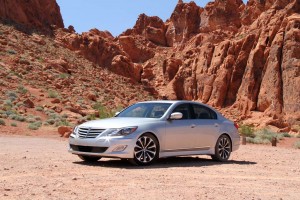
The outgoing 2011 model has been gaining market share, suggesting the 2012 Genesis should keep the momentum going.
Nonetheless, the ride is a bit less determined, both at high speeds and in more aggressive Gymkhana-style driving. So, no, this is not yet the BMW fighter Hyundai might be aiming for, but it’s a significant improvement over the original Genesis that we first drove on the Hyundai test track, near Seoul, four years ago.
And considering you’ll get the big new engine, which still delivers 16 City/25 Highway, for just $47,500 – including $850 in destination charges – that’s not just a bargain but a smart buy for those who aren’t willing to bankrupt the household budget for a top-line 5-Series or well-equipped Mercedes E550, never mind anything in the comparable Acura, Lexus or Infiniti lines.

